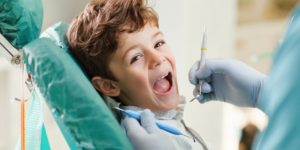As a parent, ensuring the health and well-being of your child is of utmost importance. Dental emergencies can arise unexpectedly, and knowing when to seek immediate dental care for your child is crucial in preventing further complications. In this article, we will discuss the signs that indicate your child may need emergency dental care. While routine dental visits are essential for maintaining good oral health, emergencies such as toothaches, broken teeth, or injuries to the mouth can occur at any time.
It is essential to be aware of the warning signs that warrant urgent attention from a dental professional to address the issue promptly and prevent potential long-term damage. By recognizing the symptoms early on and seeking prompt treatment, you can help alleviate your child’s pain and prevent further complications.
Prioritizing your child’s oral health is key to ensuring their overall well-being, and being informed about when to seek emergency dental care is essential in safeguarding their dental health.
Here are common signs that indicate your child may need emergency dental care and provide guidance on what steps to take in the event of a dental emergency.
1. Severe Toothache or Pain
Persistent, severe toothache is often a sign of an underlying issue, such as a cavity, infection, or abscess. If your child is experiencing intense pain, it’s essential to seek dental care immediately.
2. Bleeding in the Mouth or Gums
Unexplained or excessive bleeding in the mouth or gums can indicate trauma or a serious dental condition. This needs prompt attention to prevent further complications.
3. Swelling or Infections
Swelling around the mouth, face, or gums can be a sign of infection, which can spread rapidly if left untreated. Signs of infection include fever, pus, and general malaise.
4. Loose or Knocked-Out Tooth
A knocked-out tooth is a clear dental emergency. Immediate action can sometimes save the tooth. Similarly, a loose permanent tooth should be examined by a dentist as soon as possible.
5. Trauma to the Face or Mouth
Injuries to the face or mouth, such as cuts, fractures, or dislocations, require urgent dental evaluation to assess the extent of the damage and initiate appropriate treatment.
What to Do in Case of Emergency
Immediately contact your dentist or an emergency dental clinic. They can guide what to do next and prepare for your arrival. Administer appropriate first aid: rinse the mouth with warm water, apply a cold compress to reduce swelling, and use over-the-counter pain relievers if needed. Avoid giving aspirin to children.’
Keep your child calm and comforted. Reassure them that they will be okay and explain that the dentist will help them feel better soon. Document the incident, noting any symptoms and the actions taken. Follow up with the dentist for any recommended treatments or additional care.
Tips for Preventing Dental Emergencies
1. Regular Dental Check-Ups and Cleanings
Regular dental visits help identify and address potential issues before they become emergencies. Schedule check-ups every six months or as recommended by your dentist.
2. Encouraging Good Oral Hygiene Practices
Teach and encourage your child to brush and floss daily. Good oral hygiene can prevent many common dental problems that could lead to emergencies.
3. Using Mouthguards During Sports Activities
Ensure your child wears a mouthguard during sports activities to protect their teeth from injury.
4. Being Cautious with Hard Foods or Objects
Discourage your child from chewing on hard objects like ice or non-food items, and be cautious with hard foods that can crack or damage teeth.
FAQs(Frequently Asked Questions)
1. What should I do if my child’s tooth gets knocked out?
A: Rinse the tooth gently with water without scrubbing it, and try to place it back in the socket if possible. If this is not feasible, keep the tooth in a container of milk or the child’s saliva and seek emergency dental care immediately.
2. How can I relieve my child’s severe toothache at home before seeing the dentist?
A: You can rinse their mouth with warm water, gently floss to remove any trapped food, apply a cold compress to the cheek to reduce swelling, and give over-the-counter pain relievers such as ibuprofen or acetaminophen (avoid aspirin). However, see a dentist as soon as possible.
3. Is a broken tooth considered a dental emergency?
A: Yes, a broken tooth can be a dental emergency, especially if there is significant pain, sharp edges, or damage to the tooth structure. Seek dental care immediately to prevent further damage and ensure proper treatment.
Recognizing the signs of a dental emergency, knowing what actions to take, and understanding how to prevent such emergencies are crucial steps in maintaining your child’s dental health.
Prompt action in response to dental emergencies and proactive preventive measures can ensure your child’s oral health is protected. At Shree Dental Center, we are here to support you and your family in maintaining healthy, happy smiles.





